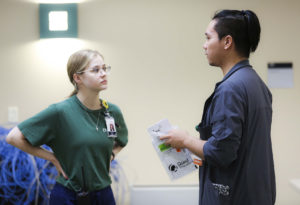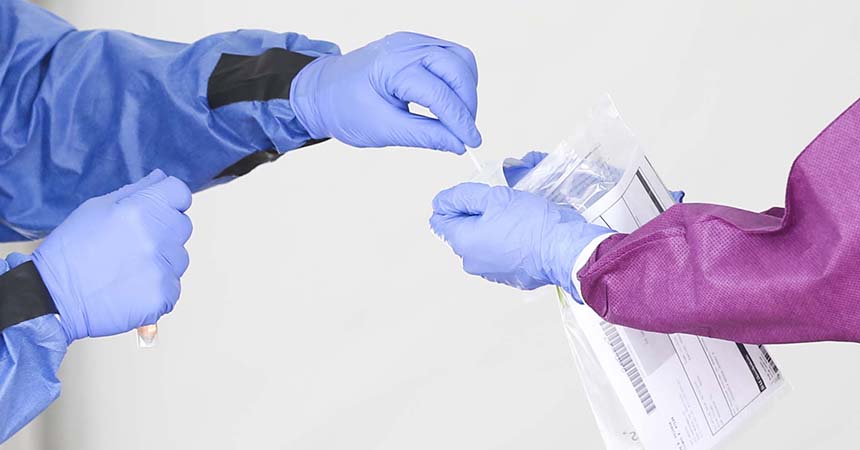HSC student volunteers heed the call to serve at COVID-19 testing site
By Diane Smith
Kristina Fraser sees COVID-19 as an enemy that spreads sickness while creating a new reality – one filled with fear and isolation.
She’s fighting back.
Fraser, a medical student at The University of North Texas Health Science Center at Fort Worth, is part of a team of student and faculty volunteers helping test people for COVID-19 at an off-campus site operated by HSC.
“Some days are harder than others, but I am thankful that I am still healthy and able to serve,” said Fraser, a third-year medical student at Texas College of Osteopathic Medicine (TCOM).
The drive-through testing site is a partnership among HSC, Catalyst Health Network, the Fort Worth Fire Department and the Moncrief Cancer Institute. It opened March 23 to first responders, such as police, fire, emergency medical technicians, sheriff’s officers, paramedics and constables.
As the community’s attack against COVID-19 evolves, healthcare workers and essential mass transit employees were added to the list of people who can be tested at the site.
Student volunteers said they are learning while fighting COVID-19.
Fraser said she is growing.
“I never thought I would be a student lead in a drive-through COVID-19 testing center,” Fraser said. “It has been rewarding to help build this process from the ground up.”
‘HSC Anti-COVID Commandos’
Dennis Kulp, a third-year medical student at TCOM, said HSC emerged as a leader during an emergency.
“This terrible pandemic has been devastating in both its reach and impact, but as a medical student growing through this, I have learned so much about process improvement and instituting safe and effective systems for the community and in response to the possibility of emerging disasters,” Kulp said.
Student volunteers represent several academic programs at HSC, including TCOM, School of Health Professions and the UNT System School of Pharmacy.
The students work under faculty volunteers: Dr. Jeffrey Mott, Assistant Professor (SHP), Dr. Alison Pasciucco (TCOM), Dr. Rebecca Cunningham, Associate Professor of Pharmaceutical Sciences, UNT System College of Pharmacy.
“These future providers are in a trial-by-fire learning environment that not one single faculty on this campus has ever experienced,” Dr. Mott said. “We are all learning together and have pulled together at the site as one team. The HSC Anti-COVID Commandos shall prevail!”
 Each day, the testing site student leaders arrive about an hour before other volunteers.
Each day, the testing site student leaders arrive about an hour before other volunteers.
Fraser, a student leader, said she makes sure supplies are ready, speaks with the executive team about any needed changes and makes any other necessary preparations.
Then, the entire volunteer staff is instructed about specific duties.
“For the rest of the day, I am overseeing the testing process, recording feedback from volunteers, relaying information from the core team to the volunteers and helping to improve the system,” Fraser said.
Kulp said volunteers get their temperatures taken before duties begin.
“The primary goal is to be able to maintain a safe and efficient process where our scheduled community members can arrive and stay in their vehicle the entire time,” Kulp said.
People get tested in their car, and the samples are carefully placed into a container and sent to a nearby clinical laboratory, Kulp said.
“When cars arrive, they drive through different stations,” said Delissa Ramirez, a first-year pharmacy student. “We are assigned to work at one station initially, and then rotate every 30 minutes. This allows everyone to have a thorough understanding of each step of the testing process.”
At the end of the day, a “de-briefing huddle” is held, Fraser said. Then, the student leader and other volunteer leaders update the volunteer orientation document, email the volunteers for the next day, and come up with ways to implement any changes.
Quelling fears
Empathy is a key piece of the volunteers’ work.
Students said people who show up to take COVID-19 tests can be scared.
“They are nervous,” Fraser said. “We do not verbally interact with them during the testing process, but you can see it in their faces.”
They use non-verbal cues to show support. During the pre-testing process, they smile, wave, and demonstrate they are friendly and ready to help.
“I wish we could do more, but to limit our exposure, they keep their windows up so we can’t talk to them,” Fraser said.
Olivia Tomasco, a second-year student at TCOM, said they give clear expectations and make the process run as smoothly as possible.
“Our volunteers are conscious about their mannerisms and facial expressions to make the testing site the least intimidating it can be,” Tomasco said.
‘A sense of purpose’
As the nation adapts to COVID-19 reality, so do the students.
Their days are filled with online classes, balancing studies with family duties and worrying about relatives.
“This crisis has been hard on everybody,” Fraser said. “We have had to learn to adapt to a new normal. For me that means having online clinical rotations, and at first, I felt very isolated. I am lucky to have this specific opportunity with the COVID testing site because it gets me out of the house, gives me a sense of purpose, and allows me to help people.”
Working the testing site eases feelings of isolation, students said.
“I have not been able to see my parents or fiancé out of concern of exposure for them, and I miss seeing my colleagues every day; however, I have found something to dedicate my energy and attention to and that has me staying as positive as I can be,” Kulp said.
Ramirez found support from professors. She sticks to a schoolwork schedule and exercise routine.
“It has truly been difficult to adjust to balancing a new online curriculum with the never-ending needs of a cooped-up family,” Ramirez said. “However, the pharmacy professors have gone above and beyond, remaining accessible to students and communicating regularly.”
The students said they are growing as leaders.
“I will walk away from this confirming that I have a deep passion for being where I am needed, being on the front lines in a crisis, and that I have the knowledge and skills to set up a structure or process to meet the needs of the public when we face something like this in the future,” Tomasco said.
Student leadership team:
Kristina Fraser, TCOM 2021
Catherine Daniel, TCOM 2021
Melissa Schullek, TCOM 2021
Elizabeth Douglas, TCOM 2021
Dennis Kulp, TCOM 2021
Zach Sumner, TCOM 2021
Kristopher Aten, TCOM 2021
Olivia Tomasco, TCOM 2022



![Uyen Sa Nguyen Scaled[58]](https://www.unthsc.edu/newsroom/wp-content/uploads/sites/16/Uyen-Sa-Nguyen-scaled58-145x175.jpg)


Social media